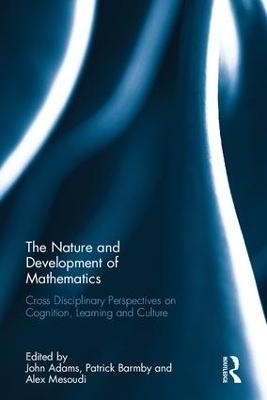
The Nature and Development of Mathematics
Routledge (Verlag)
978-1-138-12441-7 (ISBN)
Including perspectives from anthropology, education and psychology, The Nature and Development of Mathematics addresses three core questions: Is maths natural? What is the impact of our culture and environment on mathematical thinking? And how can we improve our mathematical ability? Examining the cognitive processes that we use, the origins of these skills and their cultural context, and how learning and teaching can be supported in the classroom, the book contextualises each issue within the wider field, arguing that only by taking a cross-disciplinary perspective can we fully understand what it means to be numerate, as well as how we become numerate in our modern world.
This is a unique collection including contributions from a range of renowned international researchers. It will be of interest to students and researchers across cognitive psychology, cultural anthropology and educational research.
John W. Adams is a Lecturer in Psychology and a Fellow of the Wolfson Research Institute for Health and Wellbeing, Durham University. His research interest is in cognitive development and its relation to educational attainment which includes the role of working memory in the development of mathematical skills. Patrick Barmby is a Senior Lecturer in Mathematics Education at Wits University in Johannesburg. His research interests include use of representations in classrooms, problem solving and mathematical thinking, attitudes towards mathematics and eye-tracking research. Alex Mesoudi conducts research into human cultural evolution and social learning using lab experiments and theoretical models. His work intersects anthropology, archaeology, biology and psychology.
1. Introduction – Will 3 into 1 Go? A multi-disciplinary view of emergent maths John W. Adams, Patrick Barmby, and Alex Mesoudi 2. Nature/genes – is maths natural? 2.1 Nature/Nurture and the Origin of Individual Differences in Mathematics: Evidence from Infant and Behavioural Genetics Studies Elena Rusconi and Janet McLean 2.1.1 Commentary Ubiratan D’Ambrosio and Manoel de Campos Almeida McLean 2.2 An animal’s sense of number Giorgio Vallortigara 2.2.1 Commentary Elena Rusconi and Janet McLean 2.3 Ethnomathematics and the Emergence of Mathematics Ubiratan D’Ambrosio and Manoel de Campos 2.3.1 Commentary Giorgio Vallortigara 3. Culture/environment – the impact of society 3.1 Early Emergence of Quantitative Knowledge: Implications for Educational Practice David C Geary 3.1.1 Commentary Sieghard Beller and Andrea Bender 3.2 Number systems in Oceania: The cultural evolution of a cognitive tool Andrea Bender and Sieghard Beller 3.2.1 Commentary Stephen Lerman 3.3 Culture, the environment and the impact of society: An educational perspective Stephen Lerman 3.3.1 Commentary David C Geary 4. Improving maths attitudes/learning 4.1 Improving working memory to enhance maths performance Joni Holmes and Darren Dunning 4.1.1 Commentary Alex Mesoudi 4.2 What is mathematics? Perspectives inspired by anthropology Jens Hoyrup 4.2.1 Commentary Gilah C Leder 4.3 Attitudes to mathematics, its teaching and learning – Educational perspectives Gilah C Leder 4.3.1 Commentary Joni Holmes and Darren Dunning 5. Discussion – Does it all add up? John W. Adams, Patrick Barmby, and Alex Mesoudi
| Erscheinungsdatum | 04.06.2017 |
|---|---|
| Zusatzinfo | 3 Tables, black and white |
| Verlagsort | London |
| Sprache | englisch |
| Maße | 156 x 234 mm |
| Gewicht | 1150 g |
| Themenwelt | Geisteswissenschaften ► Psychologie ► Allgemeine Psychologie |
| Geisteswissenschaften ► Psychologie ► Pädagogische Psychologie | |
| Geisteswissenschaften ► Psychologie ► Verhaltenstherapie | |
| Mathematik / Informatik ► Mathematik | |
| Sozialwissenschaften ► Soziologie | |
| ISBN-10 | 1-138-12441-9 / 1138124419 |
| ISBN-13 | 978-1-138-12441-7 / 9781138124417 |
| Zustand | Neuware |
| Informationen gemäß Produktsicherheitsverordnung (GPSR) | |
| Haben Sie eine Frage zum Produkt? |
aus dem Bereich


